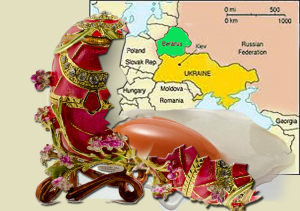 John Lloyd: “Russia, with faltering growth, a demographic crisis and no modernization in sight, is a year or two away from the economic fever ward.”
John Lloyd: “Russia, with faltering growth, a demographic crisis and no modernization in sight, is a year or two away from the economic fever ward.”
The threats are many things, including the attractions of the EU balanced against Russia’s growing Muslim populations and the inefficiencies of Russia’s still largely state controlled economy. Lloyd, however, writes about the economics, pointing out that a huge part of the former USSR’s industrial base was in Ukraine. Today Ukraine has a current account deficit of nearly 10 percent and a fiscal deficit of 7.5 percent.
Lloyd says “These are very high, but need not be deadly if the economy is healthy and reform is under way. But Ukraine’s economy is sick, and reform will be difficult. Alone among the former Soviet republics, Ukraine has made no post-communist headway. It’s as poor now as it was in 1989.”
In contrast, Lloyd says “Belarus, the smallest of the Slav republics, had been a post-Soviet success. The authoritarian government could boast of GDP growth in the pre-crash mid-2000s of 10 percent or more. No more – the bi-monthly newsletter Belarus Digest says “long run growth potential has weakened, productivity lags behind the rest of the world and the currency reserves are depleting.””
Of course the biggest issue is the motherland itself. The Russian word “zastoi” (stagnation) conjures up the years of Leonid Brezhnev, years when the Soviet system concentrated on imperialist agendas and the Soviet economy stagnated. Putin may be brighter than Brezhnev but his willingness to trade hegemony for economy is all too evident.
One of Russia’s most senior bankers, speaking to Lloyd on terms of anonymity, painted a picture of stagnation. The banker, quoted by Lloyd, says “For Putin, political stability is definitely number one.” The banker notes noted that with a stabilization fund of $500 billion and poll ratings heading toward 70 percent after his display of solidarity with the Russian speakers in Ukraine, Putin’s response to distant economic problems may tend to be, “What? Me worry?”
Lloyd comments that Putin should worry. “Growth this year won’t be much greater than 1 percent — perhaps even below that level if sanctions are imposed. Real wages are declining after years in which they rose by up to 10 percent, productivity is only 30 percent of U.S. levels — about the same as in the “stagnant 1970s, household savings are down as people raid their savings accounts, inflation is between 6 percent and 7 percent and foreign debt is rising.”
“Alarms are sounding throughout Russia’s economy. The fact that the state has taken control of the strategic sectors of oil, gas and telecommunications leaves little for the embattled private companies to invest. “Russia needs modernization urgently,” said the banker, “more than other emerging and competitor economies like Brazil or Poland.””